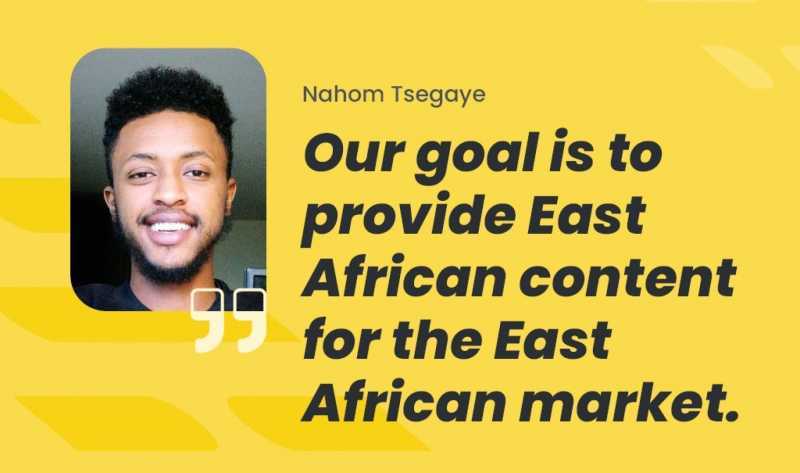Teraki - A Breakthrough During Turbulent Times

Teraki's CEO, Nahom Tsegaye, sat down with us to share their thrilling journey of making this fascinating application.
We are all looking for ways to get entertained and inspired. Audio, among others, is becoming a go-to media to satiate our entertainment needs. Whether it’s music, podcast, or other formats, there is an ever-growing demand. The Teraki team caught on to this trend and has managed to create an incredible platform. Teraki is a mobile application where users stream, purchase, and download audiobooks and podcasts. The CEO, Nahom Tsegaye, sat down with us to share their thrilling journey of making this fascinating application.
Two young entrepreneurs, Nahom Tsegaye and Abel Engida founded Teraki. After a while, however, they have added one more co-founder, Nardos Estifanos. Currently, Nahom works there as the CEO of the company while Abel is the COO and Nardos the CTO. Nahom says that their team has grown since then. Teraki has different teams for production, content creation, and narration.
The idea behind Teraki is an old one, Nahom says. The early founders (Nahom Tsegaye and Abel Engida) came up with the concept of Teraki during their university days. However, they didn’t continue with the idea and had to shelve it for a while. The outbreak of COVID-19 revived Teraki. The founders noticed many people were staying indoors and installing internet services in their households. This prompted them to turn Teraki into a reality. The name Teraki is an Amharic word for “narrator.” Nahom says he wanted a simple, catchy, Ethiopian name for their project. Since the main purpose of their project was to narrate audiobooks, the name Teraki was an obvious choice.

Nahom told us one of their goals is to distribute East-African content to the East-African market. Creating a large platform to connect authors with their audience is another area Teraki is striving to succeed. The CEO said that their company is not just in tech but also in production. They collaborate with authors, publishers, right owners, and other stakeholders. Such endeavors, Nahom described, are crucial to achieving their expansion goal.
Nahom says that they have faced numerous challenges when starting up. It took him and his team about a year to launch their initial project to the public. During that time, the startup environment was not as cohesive, compared to now. Government offices had trouble accepting their business plan, Nahom says. Figuring out a digital payment method was also a big challenge. Teraki also had to collaborate with many different stakeholders apart from developers, which was a challenge by itself. Nahom says they used different approaches to solve diverse problems, but the main thing was not to give up easily. Timing-wise, things didn’t go according to plan, Nahom says, but they solved their problems “one step at a time.”
Nahom believes that there is a lot to be done in the startup ecosystem. A lot of change is expected in the Ethiopian policy which, Nahom says, is impeding the development of startups. These policies should open themselves up to motivate the startup ecosystem. The investment policies of Ethiopia also need revision, Nahom says. For example, in Ethiopia, the minimum amount of capital required from an investor who wants to invest in startups is 200,000 USD, which is a lot. Policies like this and others impede the development of the startup ecosystem. Market-wise, Nahom believes there is a huge potential in Ethiopia. The country’s growing population creates a considerable need for products in all sectors, providing a great opportunity for startups.
Nahom is an advocate for legal frameworks that facilitate the startup environment. He spoke on the importance of developing an understanding between the government and entrepreneurs. As Ethiopia is in the process of passing the first startup act into law, he affirmed this move’s significance. Drawing from his experience, Nahom believes it will solve the startup misconception throughout government offices which is creating problems for entrepreneurs.
One of the major problems facing the content production and distribution industry is the issue of copyright. Nahom has observed these problems. Securing the copyrights of the right owners is very hard, he says. Since Teraki is both a production and distribution company, they work closely with creatives to ensure a mutually beneficial agreement. Content goes through various processes, including legal, before getting published. Teraki advocates for the fair compensation of creators that could improve their lives.

Nahom says that there is some competition in their market. We can find several apps offering similar services to that of Teraki. Nahom says that they always try to improve themselves to be more suitable to their users. Nonetheless, Teraki has found a validated market, which is why its competitors are increasing. Even though the market is relatively new, Nahom believes that they are on the top and will work hard to maintain that spot. Healthy competition is a good thing, Nahom says, and will prompt them to be more successful.
When asked if they plan to provide music content on their platform, Nahom said that currently, it is not in their plans. He adds that the music industry has its own formula, and compared to other markets, has a firmer competition. Because of this, Teraki doesn’t see the music industry as its niche.
Teraki generates revenue by selling its products to both local and foreign markets. They use card processing such as credit cards for foreign markets while using local payment methods like Telebirr and mobile banking systems for the local market. Teraki currently offers a one-time purchase plan for its products rather than a subscription-based service. But Nahom says that they plan to create a subscription-based option as well. Apart from that, Teraki also provides a vast amount of free content for its users.
Nahom is all about productive communication within his team. He asserts this will form a more in-depth understanding among teammates and keep everyone motivated. The other way to keep them inspired is by highlighting their accomplishments. He said he always brings up how far they have come and discuss future plans. He is confident this helps those working with him to go further.
As the CEO of a successful startup, Nahom’s advice for new startups is first to know their consumers. Usually, in tech startups, there is a tendency to focus more on the gadgets, such as apps and websites, and ignore the overall product. Nahom says that he always asks himself what the consumer wants. He believes that every startup should emphasize the needs of its consumers.
In a short time, Teraki has managed to build a large customer base and gained positive feedback. But Nahom believes there is more to do. In the next five years, Teraki plans to be the largest audiobook and podcast streaming platform in Ethiopia. Teraki also intends to join the East-African market by expanding to neighboring countries.
Teraki is perhaps a good example of a silver lining. Two young students’ idea had the chance to materialize in one of the worst times we experienced. The pandemic has obstructed the day-to-day lives of many, but for some, like Teraki’s founders, it gave them the motivation they needed to bring an exciting platform to life. Teraki has come so far from where it began and is now an extensive means of inspiration for us all.
Download Teraki App on Google Play, and also catch Loline Mag's podcast there!
